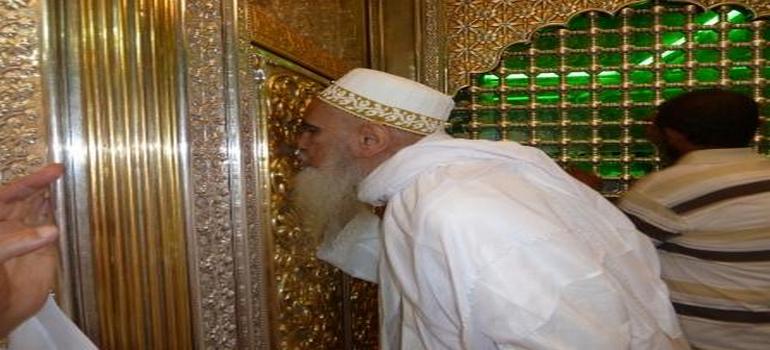Wahhabis think that ziyarah, is a polytheistic act of seeking intermediation, and renders a person outside the pale of religion. This is while ziyarah, according to the Ahl al-Sunnah, has been considered permissible. In this context, as in many other beliefs as well, Wahhabism is at odds with the Ahl al-Sunnah

Wahhabis think that ziyarah, is a polytheistic act of seeking intermediation, and renders a person outside the pale of religion. This is while ziyarah, according to the Ahl al-Sunnah, has been considered permissible. In this context, as in many other beliefs as well, Wahhabism is at odds with the Ahl al-Sunnah.
The views of Ibn al-Qudamah:
Ibn al-Qudamah, a leading figure and faqih of the Ahl al-Sunnah, while regarding ziyarah, like mourning, as consistent with the laws of Islam, elaborates that ziyarah is permissible for men while undesiderable {makruh} for women. In confirming this view, he has cited the following tradition:
لَعَنَ اللهُ زُوّارَاتِ القُبُورِ، الْمُتَّخِذَاتِ عَلَیْهِنَّ الْمَسَاجِدَ وَالسُّرَجَ.
Allah curses the visitors of the graves, especially women who light candles on the graves and take them as their place of prostration or mosque.
And he adds,In this tradition, the phrase, “Allah curses…” implies aversion, and this aversion is more intense for women according to their welfare; for, it is possible that by going outside the house and to be present in the public, the rights of the husband might be violated. The reason behind the curse on female visitors {za'irin} is because of the fact that the people during the pre-Islamic period of ignorance {jahiliyyah} used to visit the graves. After sometime, they would construct statues and images on the grave. Then, these would be treated as idols and they would pay reverence in front of these. So, they were cursed and the visitation of the women was prohibited. [1]
In continuation, he writes:
Visiting graves is mustahabb for men. Regarding its being makruh or impermissible for women, there are two pertinent traditions. According to a tradition, it is mustahabb provided that, like men, they read beside the grave surahs of at-Tawhid (al-Ikhlas) and Ya Sin, and ayat al-Kursi, but according to another tradition, it is not permissible. In case of its permissibility, man and woman should recite this salutation:
السَّلاَمُ عَلَیْکُمْ أهْلَ الدِّیَارِ مِنَ الْمُؤمِنِینَ وَالْمُسْلِمِینَ، إنَّا إنْ شَاءَ اللهُ بِکُمْ لاَحِقُونَ، نَسْألُ اللهَ لَنَا وَلَکُمُ العَافِیَهَ
“Peace be upon you, O believers and Muslims who inhabit these graves. We will join you, God willing. We pray Allah for wellbeing for you and us.”[2]
Ibn al-Qudamah does not regard the ziyarah as permissible for women, saying:
وَتُكْرَهُ لِلنِّسَاءِ، لأنَّ النَّبِيَّ قال: لَعَنَ اللهُ زُوَّارَاتِ القُبُورِ
Ziyarah for women is makruh (dis commended) because the Prophet said, 'Allah curses the women who visit the graves'.
He believed that the Prophet (s) initially prohibited ziyarah for women and the phrase, “Allah curses…” bespeaks of this fact. But afterward, he considered the ziyarah for women as permissible, saying:
کُنْتُ نَهَیْتُکُمْ عَنْ زِیَارَهِ القُبُورِ، فَزُورُوهَا
I was prohibiting you from visiting to grave in the past, but now you may do so.
Ibn al-Qudamah also says:
وَرَوَی التِّرْمِذِیُّ أنَّ عَائِشَهَ زَارَتْ قَبْرَ أخِیهَا
Tirmidhi narrated that 'a'ishah visited the grave of her brother ('Abd ar-Rahman).
In the end, Ibn al-Qutadah concludes from the set of the decrees on the permissibility and honor (of ziyarah) in the quoted hadiths that it is loathsome for the women to perform ziyarah. [3][4]
Note:
1- Ibn al-Qudamah, Al-Mughni, vol. 2, p. 430.
2- Ibid.
3- Ibn al-Qudamah, Al-Mughni, vol. 4, pp. 426, 431.
4- Ibrahimi, Muhammad Husayn, A New Analysis of Wahhabi Doctrines, p49-50.



